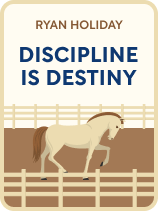

This article is an excerpt from the Shortform book guide to "Discipline Is Destiny" by Ryan Holiday. Shortform has the world's best summaries and analyses of books you should be reading.
Like this article? Sign up for a free trial here.
Are you enjoying success in your life right now? What’s the key to maintaining success and keeping it from slipping through your hands?
In Discipline Is Destiny, Ryan Holiday asserts that self-discipline is essential to maintaining your success in good times. He contends that practicing discipline can help you with four things that come with success: ego, pleasure, power, and money.
Discover how to maintain success through the power of discipline.
1. Handle Your Ego
Holiday asserts that to know how to maintain success, you must first keep your ego in check. Your success with self-discipline may make you a role model that other people want to follow, but don’t expect that others will practice discipline just because you are doing so. Instead, focus your energies on your own behavior and let others do what they will. Similarly, don’t let your ego convince you that you no longer need self-discipline. The more successful you become, the greater the temptations you’ll face—but if you want to maintain that success, you need to continue practicing the discipline that made you successful.
Additionally, don’t let your ego tie you to habits that no longer serve you. Holiday warns that you may grow so attached to the habits that made you successful that you stick to them—even when they’re not having the same impact they had before. Prevent this by regularly examining your routines and modifying them if they’re no longer working. Otherwise, you won’t be able to keep up with the world as it changes.
| Holiday’s Other Views on Ego In Ego Is the Enemy, Holiday also warns that keeping your ego in check is essential to maintaining success. But rather than focusing on how sticking to certain habits can destroy your success, he focuses on how certain traits that brought you success can, if left unchecked, rob you of it. To avoid this trap, Holiday advises looking out for certain feelings your ego might enhance. First, your confidence may grow into hubris that convinces you that you’re entitled to the things you desire (which, although Holiday doesn’t mention this, may also make you feel as though you deserve to indulge in certain temptations). Second, you might start expecting everything to go your way as if you control the world—or the people around you. Holiday contends you can avoid this fate by remembering that you don’t have a claim on anything that’s not already yours and by recognizing that you’re not the center of the world. |
2. Handle Pleasure
According to Holiday, another way to practice discipline when you’re successful is to look for opportunities to make your life less pleasant, such as by immersing yourself in cold water. Regularly experiencing displeasure will make you unafraid of living without the trappings of success, which may be an essential skill if you ever lose your fortune.
(Shortform note: Regularly experiencing displeasure by immersing yourself in cold water may also improve your ability to handle stressors like potentially losing your fortune. This is because, as Wim Hof explains in The Wim Hof Method, the cold causes a physiological response that’s identical to your response to emotional stressors—so by training yourself to handle the cold through repeated exposure, you train yourself to handle other kinds of stress, too.)
For example, the Roman philosopher Seneca possessed great wealth, but he regularly went without—for instance, by sleeping on the ground—to remind himself that he could handle being poor and that losing his wealth was not as terrifying as it seemed. This habit came in handy when he fell out of favor with the emperor Nero: Seneca was able to willingly give Nero all his riches in exchange for his life because he was unafraid of losing the trappings of success.
(Shortform note: By highlighting Seneca’s habit of going without, Holiday presents Seneca as a model of Stoic philosophy and Nero as a clear villain. But the two had a complicated relationship: Seneca was famously Nero’s tutor and at times supported Nero’s questionable behavior, such as by lying to the Roman Senate that Nero’s mother was planning a coup after Nero tried to kill her.)
3. Handle Power
Holiday suggests that another way to practice discipline is by learning how to handle power. Contrary to popular opinion, gaining power doesn’t give you extra perks; rather, power is the perk. Therefore, you ought to do more than the people below you—not less, as most are wont to do. For example, when former Defense Secretary (and then-Brigadier General) James Mattis encountered a soldier performing guard duty on Christmas Day, he sent the soldier home to enjoy the holiday and worked guard duty himself—instead of deciding that his holiday off was a perk of power.
(Shortform note: Holiday’s perspective on power aligns with that of Simon Sinek. In Leaders Eat Last, Sinek argues that if you’re a leader, your primary responsibility is to prioritize your subordinates’ needs above your own. By doing so, you prove that you see them as people—not as assets you can use. As a result, your subordinates feel as though you support them, which makes them feel safe and thus more willing to collaborate and take the risks necessary for success. Mattis made his soldiers feel that way both through his actions (like working guard duty on Christmas) and through his words: One soldier praised Mattis for giving a relatable speech during wartime, saying, “Mattis spoke like an enlisted man. He spoke to the enlisted man.”)
Additionally, you must learn to give up power. The most self-disciplined people have control over themselves; as a result, they don’t desire control over others. Moreover, they understand that having too much power often leads to self-destruction—and so they’re willing to give it up. (Shortform note: In David and Goliath, Malcolm Gladwell proposes that having too much power leads to destruction: When you have power, you forget that you only have as much power as your subjects are willing to give you. If you take an action that your subjects deem unfair or unpredictable, or that makes them feel voiceless, they view your power as illegitimate and grow defiant—which weakens your power and may lead to your destruction.)
4. Handle Money
Finally, Holiday argues that practicing discipline when you’re successful requires you to adjust your view of money. Some people believe that if they make enough money, they’ll be able to do whatever they want. They won’t need self-discipline because they can spend freely and ignore others’ opinions. But while money can make your life easier, it can’t free you from all life’s worries; you’ll still need the self-discipline to handle them. So instead of needlessly striving for money that will let you do whatever you want, strive for an amount that allows you to live in accordance with your purpose.
(Shortform note: In The Psychology of Money, Morgan Housel also warns against relentlessly chasing money, explaining that if you always want more money, you might risk your existing wealth for additional wealth you don’t even need. To stop striving for more, Housel recommends accepting that somebody else will always have more money than you do. Otherwise, you’ll always compare yourself to others and never be satisfied.)

———End of Preview———
Like what you just read? Read the rest of the world's best book summary and analysis of Ryan Holiday's "Discipline Is Destiny" at Shortform.
Here's what you'll find in our full Discipline Is Destiny summary:
- Why your ability to practice discipline determines how successful you are
- How to practice discipline throughout various stages of your life
- Why the greatest enemy to discipline is your ego






